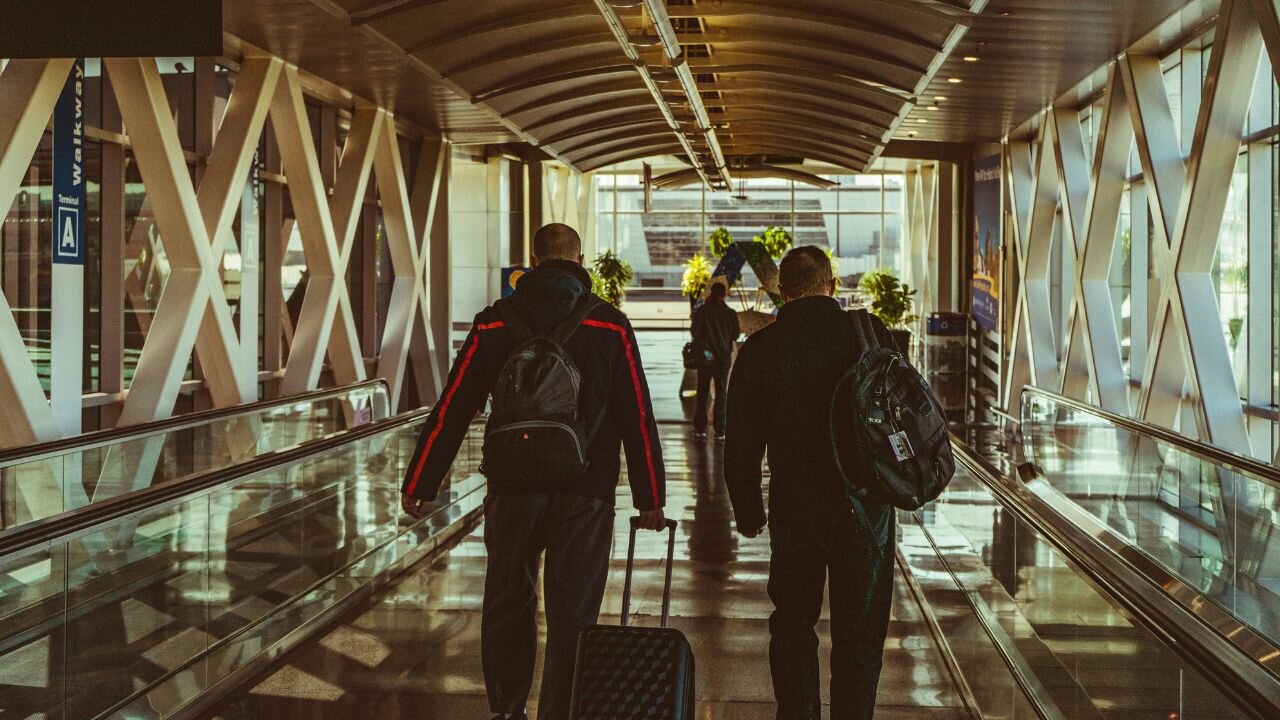Premium Only Content

How travel disruptions affected Americans last year
A new study has found seven in 10 Americans have had their travel plans go wrong within the past year.
The poll of 2,000 U.S. adults who have traveled in the last 12 months found 46% have had flights delayed or canceled, 28% have lost their luggage, 15% have had their reservations changed without notice and 11% have had their personal belongings damaged.
Four in 10 of them said their travel woes, including unexpected events and accidents, have completely derailed their trip — some citing they’ve had to endure hurricanes, blizzards, car breakdowns, stolen luggage, plane damage, missing pilots and even military operations.
Commissioned by AXA Partners and conducted by Talker Research, the study also found the average person plans their trips eight weeks in advance and will spend $1,120 to make their travel arrangements.
Seventy-seven percent agreed the cost of travel today is uncomfortably expensive, and many will omit travel essentials and niceties just to stay under budget.
Travelers said they give up premium car rentals (52%), premium seating (50%), in-flight entertainment (46%) and luggage fees (45%) if they need to.
More than a third (36%) will even skip out on buying travel insurance, believing it either won’t be used (40%), that it’s too expensive (36%) or that they won’t need it for short trips (26%).
Despite this, 58% admitted they were concerned about an unexpected event or accident occurring while they travel. And 63% know they would be left feeling frustrated if something were to happen.
“We can always hope that our trips are nice and smooth, but it’s hard to predict when the unpredictable might happen,” said Stephen Samataro, Chief Revenue Officer at AXA Partners. “When the cost of these trips are seemingly always increasing, there’s a sense of urgency to make sure you’re getting every cent’s worth — but when the unexpected happens, it can have dire consequences beyond just what you’re paying.”
The study found 42% of travelers said they bought travel insurance ahead of their last trip, and a majority of them found it to be worth the price.
Half said they were able to get fully reimbursed for canceled trips. Meanwhile, others were compensated for their lost luggage (25%), were covered for a personal injury that occurred on vacation (21%) or were compensated for damaged personal belongings (20%).
More than nine in 10 (92%) said their experiences with travel insurance were so worth it, they would likely purchase it for any future travel they have. And 88% would recommend others get it as well, based purely on their own experiences.
“I believe having peace of mind goes hand-in-hand with travel,” continued Stephen Samataro. “People deserve to enjoy their travels without the added worry and stress of something going wrong.
“The survey shows that a majority of people are likely to have some disruption in their trip, and when that occurs, there’s nothing that can bring an immediate sense of relief than having your entire trip covered by insurance.”
Survey methodology:
Talker Research surveyed 2,000 Americans who have traveled in the past 12 months — domestic OR international; the survey was commissioned by AXA Assistance and administered and conducted online by Talker Research between September 13 and September 19, 2024.
We are sourcing from a non-probability frame and the two main sources we use are:
● Traditional online access panels — where respondents opt-in to take part in online market research for an incentive
● Programmatic — where respondents are online and are given the option to take part in a survey to receive a virtual incentive usually related to the online activity they are engaging in
Those who did not fit the specified sample were terminated from the survey. As the survey is fielded, dynamic online sampling is used, adjusting targeting to achieve the quotas specified as part of the sampling plan.
Regardless of which sources a respondent came from, they were directed to an Online Survey, where the survey was conducted in English; a link to the questionnaire can be shared upon request. Respondents were awarded points for completing the survey. These points have a small cash-equivalent monetary value.
Cells are only reported on for analysis if they have a minimum of 80 respondents, and statistical significance is calculated at the 95% level. Data is not weighted, but quotas and other parameters are put in place to reach the desired sample.
Interviews are excluded from the final analysis if they failed quality-checking measures. This includes:
● Speeders: Respondents who complete the survey in a time that is quicker than one-third of the median length of interview are disqualified as speeders
● Open ends: All verbatim responses (full open-ended questions as well as other please specify options) are checked for inappropriate or irrelevant text
● Bots: Captcha is enabled on surveys, which allows the research team to identify and disqualify bots
● Duplicates: Survey software has “deduping” based on digital fingerprinting, which ensures nobody is allowed to take the survey more than once
It is worth noting that this survey was only available to individuals with internet access, and the results may not be generalizable to those without internet access.
-
 1:12
1:12
SWNS
19 days agoMajority of Americans plan to spend tax refund on necessities
461 -
 1:17:59
1:17:59
Sarah Westall
7 hours agoDOGE: Crime & Hysteria bringing the Critics & the Fearful - Plus new CDC/Ukraine Crime w/ Dr Fleming
31.2K3 -
 45:39
45:39
Survive History
13 hours ago $3.76 earnedCould You Survive in the Shield Wall at the Battle of Hastings?
38.7K5 -
 1:50:28
1:50:28
TheDozenPodcast
12 hours agoViolence, Abuse, Jail, Reform: Michael Maisey
82.3K4 -
 23:01
23:01
Mrgunsngear
1 day ago $4.41 earnedWolfpack Armory AW15 MK5 AR-15 Review 🇺🇸
72.5K12 -
 25:59
25:59
TampaAerialMedia
1 day ago $2.26 earnedUpdate ANNA MARIA ISLAND 2025
44.2K4 -
 59:31
59:31
Squaring The Circle, A Randall Carlson Podcast
14 hours ago#039: How Politics & War, Art & Science Shape Our World; A Cultural Commentary From Randall Carlson
34.1K2 -
 13:21
13:21
Misha Petrov
14 hours agoThe CRINGIEST Thing I Have Ever Seen…
27K53 -
 11:45
11:45
BIG NEM
10 hours agoWe Blind Taste Tested the Best Jollof in Toronto 🇳🇬🇬🇭
18.7K1 -
 15:40
15:40
Fit'n Fire
13 hours ago $0.38 earnedArsenal SLR106f & LiteRaider AK Handguard from 1791 Industries
16.3K1